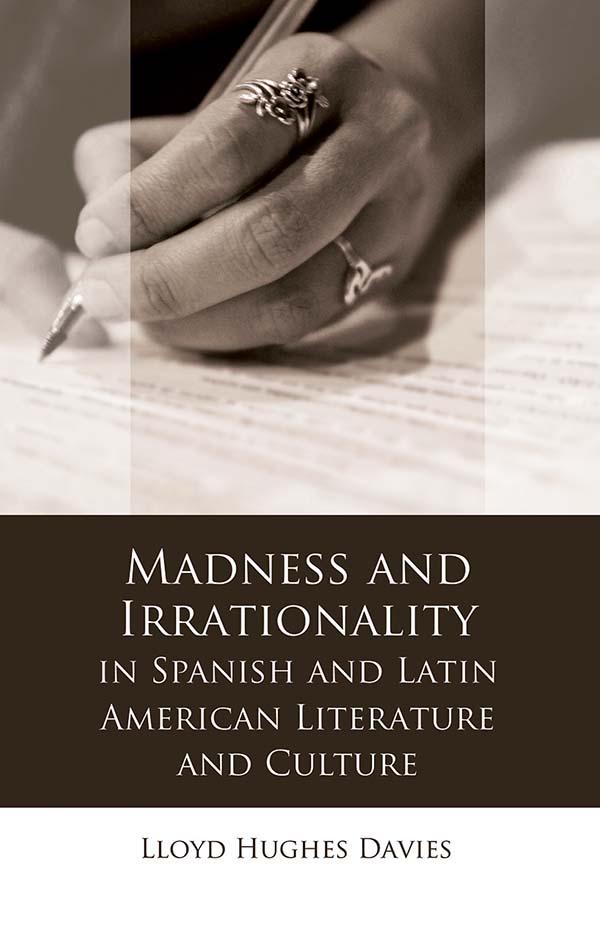Madness and Irrationality in Spanish and Latin American Literature and Culture
Awdur(on) Lloyd Hughes Davies
Iaith: Saesneg
Dosbarthiad(au): Literary Criticism
Cyfres: Iberian and Latin American Studies
- Mehefin 2020 · 272 tudalen ·216x138mm
- · Clawr Meddal - 9781786835758
- · eLyfr - pdf - 9781786835765
- · eLyfr - epub - 9781786835772
Am y llyfr
This is the first monograph to consider the significance of madness and irrationality in both Spanish and Spanish American literature. It considers various definitions of ‘madness’ and explores the often contrasting responses, both positive (figural madness as stimulus for literary creativity) and negative (clinical madness representing spiritual confinement and sterility). The concept of national madness is explored with particular reference to Argentina: while, on the one hand, the country’s vast expanses have been seen as conducive to madness, the urban population of Buenos Aires, on the other, appears to be especially dependent on psychoanalytic therapy. The book considers both the work of lesser-known writers such as Nuria Amat, whose personal life is inflected by a form of literary madness, and that of larger literary figures such as José Lezama Lima, whose poetic concepts are suffused with the irrational. The conclusion draws attention to the ‘other side’ of reason as a source of possible originality in a world dominated by the tenets of logic and conventionalised thinking.
Dyfyniadau
‘Drawing on Nietzsche’s comment that “Plato was speaking for the whole of humanity when he said: ‘From madness Greece has derived its greatest benefits’”, and Virginia Woolf’s insight that “as an experience, madness is terrific”, Lloyd Davies’s new book is a fantastically comprehensive study of madness and irrationality in Spanish and Latin American literature and culture. This is a cornucopia of madness with – as you might expect – examples of Quixotic madness, but we are also regaled with tales of clinical madness, political madness (the “locas” of the Plaza de Mayo), Baroque madness, cultural madness, linguistic madness, feminist madness, criminal madness, homosexual madness, existential madness, and even bookish madness. Full of original insight and penetrating readings!’
-Professor Stephen M. Hart, University College London
‘This is a remarkably wide-ranging and cultivated book, which manages to be very focused and detailed. As a study of “madness” as played out in culture and in Spanish and Spanish American literature in particular, it effortlessly interweaves Hispanic thought and expression with other European and Anglo-American approaches. The author offers a theory of madness in an explicitly Hispanic context, focusing compellingly on Spain’s mythical foundations and the prosecution of the idea of a Spanish “nation” via exclusionary rhetoric, and on various forms of “national madness” in Latin America linked to debates about Civilisation and Barbarism, violence and terror. A series of interpretative readings of literary texts manifest different aspects of the discourse of “madness”, covering thematic aspects such as history, politics, resistance to patriarchy, literature, reading and writing, joy and imaginative freedom, the existential, and the pursuit and problematisation of reality and truth.’
-Professor Philip Swanson, University of Sheffield
Cynnwys
Contents
Acknowledgements
1.Introduction
2.The Concept of National Madness: the Argentine Paradigm
3.‘Voices in the Wilderness’: Conquest and Counter-conquest in Abel Posse
4.Morality, Madness, Memory: Royal Women in Fernando del Paso (Noticias del Imperio) and Lourdes Ortiz (Urraca).
5.Crime, Madness, Art: Alejandra Pizarnik and Manuel Vázquez Montalbán
6.Books about Books: Ruiz Zafón’s La sombra del viento and Pérez-Reverte’s El club Dumas
7.Self-Consciousness and Schizophrenia: the Literary World of Nuria Amat
8.Joy in Paradise: José Lezama Lima
9.Desert, Delirium, Digression: the Fictional Worlds of Juan José Saer
10.Conclusion
Bibliography
Index


